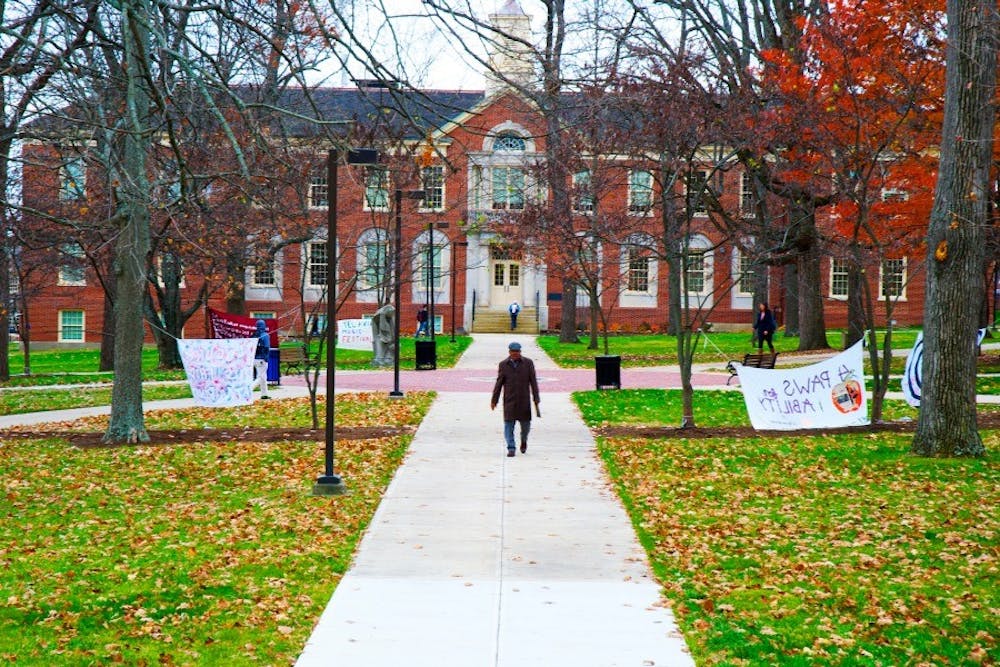By Megan Zahneis, Senior Staff Writer
Members of the Miami University advocacy chapter of the American Association of University Professors (AAUP) are circulating a faculty survey to gauge faculty morale and gather information about the issues faculty members are most concerned with on campus.
The survey, which was opened in the fall and had received 200 responses by the end of January, drew feedback on a number of faculty issues, including health and welfare, a perceived lack of transparency and shared governance at the administrative level, salaries and the university's overall mission.
Miami's AAUP Advocacy chapter secretary, Deborah Lyons, said the impetus for creating a survey stemmed from a need for the organization to better understand its members.
"When we first started talking about forming an AAUP chapter, a lot of people were frustrated with the way things were going on campus, and we had actually worked out a list of things that were sources of stress and unhappiness," Lyons said. "We wanted to see what a larger cross-section of the faculty thought about the way things were going."
As it turns out, faculty have a number of concerns about their workplace.
"One thing that many, many people mentioned was that they felt that the university has lost a sense of its mission or has turned its attention towards things that are not essential to the mission of the university which is, of course, education," Lyons said. "This is things like having lots of new fancy buildings, having a top-heavy administration, packaging education as a product or an experience rather than as a life-long activity or a collaborative effort between students and teachers."
Faculty are also concerned about their health benefits, which have eroded in recent years, and salaries, which Lyons said are, on average, lower than those at comparable institutions.
Cathy Wagner, vice president of the chapter, explained that slashing health benefits forces faculty to pay more out-of-pocket for the same coverage.
"[It] means that the university is paying less and we're paying more," Wagner said. "It has effectively amounted to a pay cut."
In a way, health benefits may be more important to Miami faculty now than ever before.
In the past 10 years, the percentage of instructors who are tenure-line has decreased 18 percent, with contingent full-time (non-tenure track) faculty numbers ballooning 180 percent. The trend of hiring more temporary faculty, Wagner and Lyons said, creates a bottleneck when it comes to administrative tasks that must be completed by tenured faculty. These duties, which include planning curriculum and other forms of service to the university, are unable to be carried out by non-tenured faculty, since they typically haven't been employed long enough to have the necessary institutional knowledge.
"There are just way, way, way fewer hands to do the work," Wagner said. "The full-time faculty are a little bit worn out."
Another major concern of faculty was the issue of transparency on the part of university administration, and a perceived lack of shared governance, the principles the AAUP builds its foundation on.
Wagner and Lyons both said that communication between faculty and administrators - particularly Provost Phyllis Callahan - has improved noticeably as of late.
"Communication with faculty is a big priority for the provost," Wagner said, adding that Callahan has taken to emailing faculty weekly updates. "I absolutely commend her for having this as a priority."
Still, there is more to be done, according to both AAUP executives.
"There are two parts to the issue," Lyons said. "We need to know what's going on, but we also need to have a seat at the table when decisions are made. Transparency is really important, but it's really [only] half of the story."
Wagner agreed.
"The optics are that [faculty] are participating in a decision, but really, the decisions have really already been made. That's the perception. It's demoralizing," Wagner said.
In an email, Callahan emphasized that her priorities are in line with the faculty's, and she believes more can be done to improve communication with the faculty.
"As a member of the faculty myself, I am acutely aware of the importance of ensuring that members of our distinguished faculty believe they are fully supported at Miami and that the leadership is listening," Callahan wrote. "Since I became Provost last year, I have worked hard to improve our communication with faculty, and we will continue to partner with them, as they are critical to our university's continued success."
Callahan first heard of the survey when a summary of voluntary faculty responses was presented at a Faculty Assembly meeting on Jan. 26. She plans to institute a more formal, university-sanctioned scientific survey that will allow administration a closer look at what changes might be made, followed by a more specific action plan.
Regardless of what the next steps are, Lyons regards the survey as a success.
"We wanted to get the issues out in the open and I think that we've done that."

